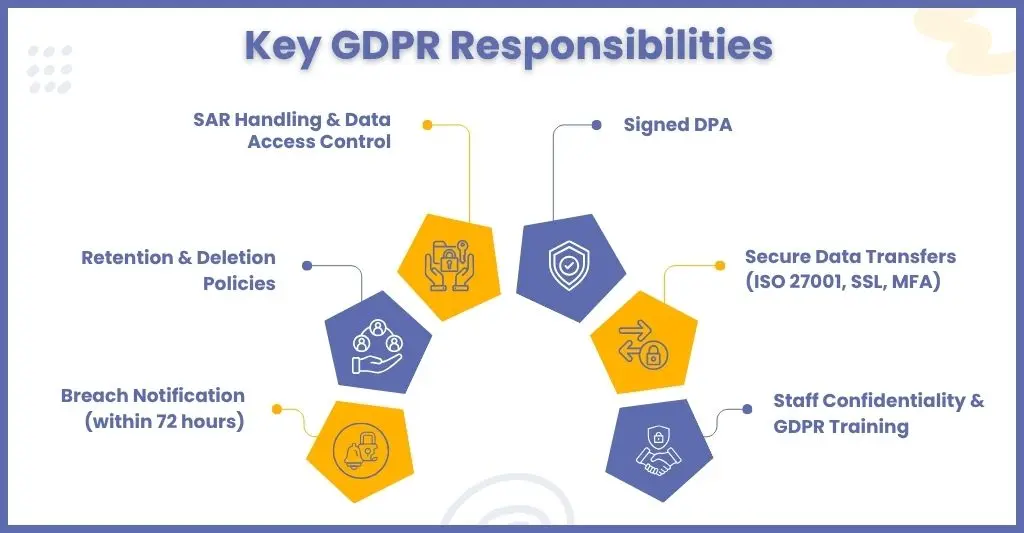For an accounting practice, GDPR compliance isn’t an option; it’s essential. However, our outsourcing firms are increasingly being approached by practices from all over the UK who are facing difficulty fulfilling the GDPR requirements. Outsourced accounting service providers handle GDPR compliance by signing Data Processing Agreements, using secure encrypted systems, limiting access to data, training staff on GDPR, and ensuring lawful international data transfers.
In this blog, we’ll explain how outsourced accounting service providers manage General Data Protection Regulation (GDPR) obligations, what to look for in a compliant partner, and how your firm can stay protected while outsourcing.
What Is GDPR and Why Is It Crucial for Accounting Firms?
The General Data Protection Regulation (GDPR) applies to all businesses handling personal data of UK residents. Under the UK GDPR, accounting practices that store, process, or share sensitive data, primarily through outsourcing, must comply with strict data protection standards.
Ideally, practices handle the personal data of their clients, but with added accounting responsibilities, accounting practices are finding it convenient to hand over certain accounting responsibilities to a professional and experienced service provider. When you hand them with your clients accounting responsibility you are required to give them access to your client’s data and that’s where GDPR becomes crucial. Let’s understand more about how outsourced accounting services providers handle GDPR compliance.
What Types of Data Do Accounting Outsourcing Providers Handle?
An outsourcing accounting provider is given an important responsibility by you for handling sensitive client and employee data. Some of the most sensitive data dealt with by accounting outsourcing service providers are as follows:
- Names and addresses
- National Insurance numbers
- Payroll and payslip details
- Tax records and UTR numbers
- Bank details and transactions
- Employment contracts and pension data
With such sensitive data handled by a third party, there have to be some checks and balances, and that’s where GDPR comes in. The requirement of data security have made GDPR compliance not an option but a compulsion for accounting practices and outsourcing service providers.
Key GDPR Responsibilities for Outsourced Accounting Providers

These days, the benefits of outsourcing accounting work have made accounting outsourcing providers handle multiple accounting functions on behalf of countless accounting firms in the UK. While providing their services, they are required to access clients’ sensitive personal data. Such access would not have been possible without proper data protection regulations in place, which the GDPR offers.
Here’s how top-tier outsourcing partners handle GDPR compliance to protect both you and your clients:
Data Processing Agreements (DPAs)
Every professional outsourced accounting service provider makes it a point to sign a legally binding data processing agreement with an accounting firm. Under this agreement, some crucial aspects are covered such as:
- The nature and purpose of data processing
- Types of data and categories of data subjects
- Roles and responsibilities of the data processor and controller
- Duration of processing
- Security measures and confidentiality obligations
Robust Data Security Measures
You will not find any professional service provider that does not take the implementation of strong data security measures seriously. Some of the strong technical and organisational safeguards to expect from a professional service provider are:
- End-to-end encryption (SSL/TLS) for data transfers
- Secure cloud storage compliant with ISO 27001
- Multi-factor authentication (MFA) for user access
- Role-based access control (RBAC) to limit data visibility
- Regular vulnerability assessments
According to a 2023 survey by AccountancyAge, 78% of UK firms outsourcing accounting functions said cybersecurity was their top concern, and 63% reported satisfaction with their provider’s security protocols.
Staff Training and Confidentiality
GDPR compliance has added a responsibility on the shoulders of service providers to train their staff and keep them updated on the latest compliance. Also, service providers’ accountants are made to sign confidentiality and non-disclosure agreements and follow internal data handling SOPs. So, we can see that GDPR compliance has changed the way how outsourcing teams operate.
By conducting staff training on GDPR on a quarterly basis outsourced service providers have managed to reduced compliance issues considerably.
Data Access and Subject Rights Management
Any UK accounting practices must ensure their outsourcing partner can support the following:
- Subject Access Requests (SARs)
- Right to rectification or erasure
- Data portability
- Restrictions on processing
A compliant outsourcing provider maintains audit logs and ensures traceability to respond within the required 30-day SAR timeline.
Data Retention and Deletion Policies
As mandated by the GDPR, every accounting firm or outsourced service provider must keep the clients’ data as long as required. Hence, outsourcing providers are expected to follow:
- Custom data retention schedules (e.g., 6 years for payroll records)
- Secure deletion protocols using GDPR-compliant software
- Regular data audits to remove outdated records
Data Breach Notification Procedures
Professional service providers will always be ready with their procedures to deal with data breaches. It is essential because a breach must be tackled without wasting any time. Most providers follow the below-listed plan:
- Notify the accounting firm within 72 hours
- Document breach details and impact
- Take corrective action to prevent recurrence
- Coordinate with the UK ICO (Information Commissioner’s Office) where necessary
What Should Accounting Practices Look for in a GDPR-Compliant Provider?
When looking for an outsourcing service provider, ensure that you give ample importance to data protection. Your client’s data is your responsibility when you give access to a third-party partner to ensure it complies with UK GDPR standards. Here’s a breakdown of the key checks you must carry out before signing any outsourcing agreement:
Signed DPA
A DPA with your outsourcing partner is a legal requirement under Article 28 of the UK GDPR. Under this agreement, terms are outlined under which the outsourced provider will process personal data on your behalf. Without this agreement, your firm could be held liable for non-compliance.
Essential points that must not be missed in a DPA are:
- Clear roles of ‘controller’ and ‘processor’
- Scope of services and data involved
- Security obligations
- Breach notification timelines
- Sub-processor clauses, if any
Data Storage Location in GDPR-Compliant Regions
Ask about the location where your client’s data will be stored because it matters. Data stored outside the UK or EEA may not be subject to equal protection laws, possibly putting your practice’s reputation at risk.
To avoid such a scenario, ensure you do the following:
- Confirm that your client’s data is hosted on servers in the UK, EU, or third countries recognised by the UK Government.
- If servers are based outside these regions, check whether Standard Contractual Clauses (SCCs) or International Data Transfer Agreements (IDTAs) are in place.
Staff Experience and Training
The machine is as good as man. We say this because even the most secure system cannot perform at its best without trained staff who can operate it flawlessly. Hence, you must select a provider that invests in their staff’s GDPR training and talent enhancement.
Therefore, before you select a service provider, ask the following things:
- Frequency of staff training on data privacy and security
- Confidentiality agreements signed by all employees
- Vetting procedures for hiring (e.g., background verification, data access control)
Compliance with ISO 27001 or Equivalent Standards
ISO 27001 is the international information security management systems (ISMS) benchmark. A provider with this certification demonstrates a structured and regularly audited approach to managing sensitive data securely.
Why it matters:
- Reduces the risk of data breaches
- Provides evidence of technical and organisational security measures
- Ensures regular audits and improvement of security systems
Support for Data Subject Rights (SARs, Deletion, Access)
Under the UK GDPR, your clients are entitled to several rights, such as:
- Right to access their personal data (SAR)
- Right to rectification or erasure
- Right to restrict or object to processing
Hence, you must choose an outsourcing partner capable of acting, especially when your client exercises any of the rights mentioned above.
To understand their capability to ask the below-mentioned questions:
- Do they maintain audit trails and logs for data access?
- Can they provide records within the GDPR’s 30-day timeline?
- Do they have a documented SAR and erasure process?
Past Handling of Data Breaches
Even with the best data security measures, no provider can guarantee full protection against data breaches. The important thing is how they will respond when an incident occurs. A GDPR-compliant partner will be transparent about past breaches and demonstrate how they’ve mitigated risks since.
To understand how a service provider performed in tackling past data breaches, you can ask for the following:
- Breach history and incident reports
- Lessons learned and improvements made
- Internal response plans and response timelines
Frequently Asked Questions (FAQ)
1. Does GDPR apply to financial services?
Financial services firms must obey with UK GDPR if they process personal data, irrespective of any FCA regulations that apply to their business activities.
2. Who is responsible for ensuring GDPR compliance in your organisation?
Data controllers are mainly responsible for GDPR compliance, so they must get legal consent, as defined in Art. 7 GDPR, from people for data processing. Their other responsibilities include: Maintaining secure records of consent preferences.
3. What should be included in a Data Processing Agreement?
Include scope of processing, data types, security measures, breach notification protocols, and data retention terms.
4. What controls should be in place for GDPR-compliant outsourced accounting?
To ensure control in place for GDPR compliant outsourced accounting, the following controls need to be in place:
a. Data encryption
b. Access control
c. Collection of only required data
d. Regular audits
e. Training and awareness of staff
f. Transparency in usage of data
Conclusion
Outsourcing accounting does not remove your responsibility for accountability. Instead, you will be the data controller, and your service provider will handle the accounting processing on your behalf. Therefore, you must choose wisely a service provider that fulfills data transparency and protection requirements.
Only those outsourced accounting service providers that follow the UK GDPR without any deviation will be capable of offering foolproof data protection. Some, like Corient, go beyond that to give you peace of mind and data confidence, helping you scale without compromise.
Corient has made its name among accounting practices by offering tech-savvy and GDPR-compliant accounting services like bookkeeping, payroll, VAT, and management accounting, to name a few. You can approach us and share your requirements on our website contact form, and our executive will contact you soon.
Wishing you luck in your future endeavors and looking forward to seeing you soon.


